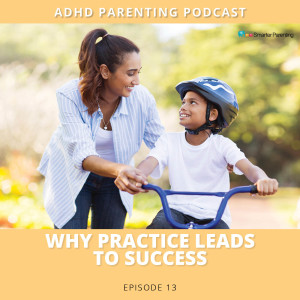
818.5K
Downloads
213
Episodes
Drawing on years of experience working with families, Parenting Coaches Siope Kinikini and Kimber Petersen share how families can improve, heal, and find success using the proven methods of the Teaching-Family Model. Visit smarterparenting.com to learn more.
Episodes

Tuesday Jun 18, 2019
Ep #13: Why practice leads to success
Tuesday Jun 18, 2019
Tuesday Jun 18, 2019
As every actor, musician, or athlete knows, practice leads to success. In today’s podcast, ADHD parenting coach, Siope Kinikini discusses the fifth element of the Teaching-Family Model, Role-playing.
Role-playing is one of the most important, but often overlooked, tool in raising successful kids. Role-playing allows a child to practice new behavior over and over again until they feel confident in handling whatever situation they are placed in. When children have confidence in their ability to handle situations because they’ve practiced it, you’re allowing them to make better decisions and to take responsibility for the decisions they are making.
We offer parental guidance when we encourage our children to practice reading or homework, or piano over and over again so they can master it. Mastering behavior is no different. We can shape new behaviors by Role-playing new behavior.
What happens to the brain when we learn something new is that new pathways are created. The more we repeat the action--whether that’s the piano or Role-playing--the stronger those pathways become until the new action becomes second nature in our brains.
Because children are learning how to navigate the world, they need a lot of practice, especially when it comes to behavior. The Teaching-Family Model is different than other behavior models in that the parent will model the behavior first. This modeling is useful in helping kids navigate life as they see how it’s done and aren’t left to guess what they should be doing. By structuring Role-plays, you are helping your child understand the importance of practicing while keeping them from getting too overwhelmed with all they are learning.
The behavior skill of Role-playing shows you what elements should be included to make Role-plays successful. Visit Smarter Parenting.com to watch the Role-playing skills lesson.
Children don’t always like to practice. Turning Role-plays into a game is one of the best ways to get your child motivated to practice as games and activities don’t always feel like practicing. For example, playing the game Simon Says is a way to Role-play. In the game, you’re practicing both the skill of Effective Communication aka listening and Following Instructions. We'd wager you child wouldn't even recognize that they're Role-playing.
Role-plays don’t have to be huge productions to be successful. What makes Role-plays successful is their repetition.
Remember, practice leads to success!
